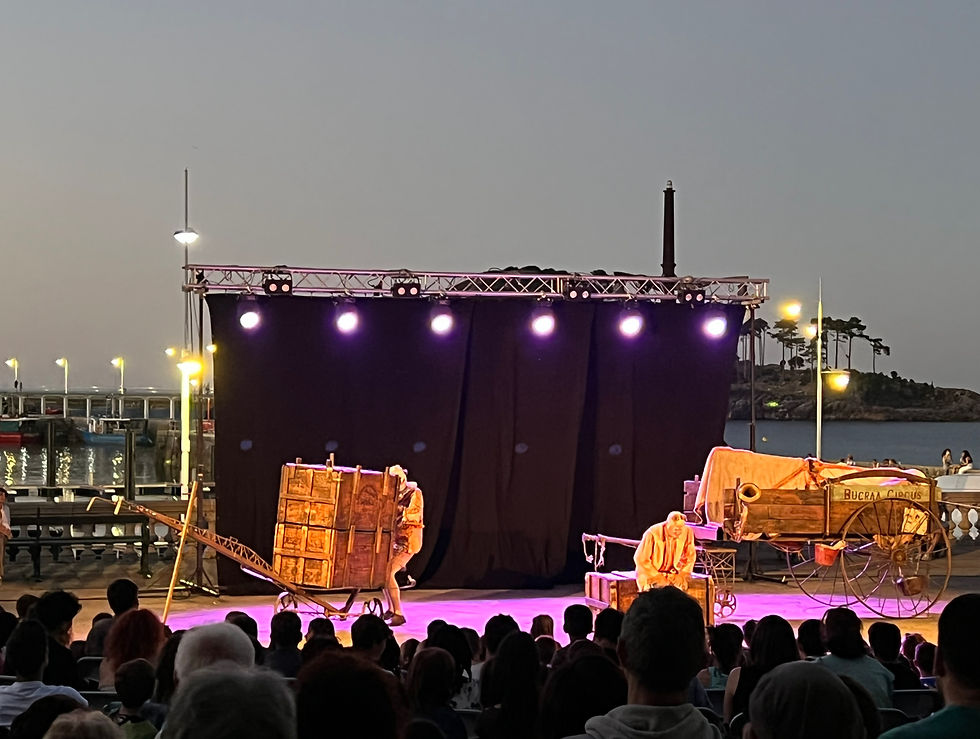July Week 2: Kaleka Lekeitioko
- Mark

- Oct 3, 2023
- 4 min read
From Bilbao I made my way to Lekeitio, a small seaside fishing village, now a theatrical epicenter. I arrived here knowing nobody, but signed up to volunteer with Kaleka the annual summer street theatre festival which took over the town. My email pal Rakel, a Basque Theatre academic, put me into contact with a women named Maider. Maider was the former director of Kaleka, and now operated Arragua, a performance art space on the outskirts of the village. Getting to meet her was one of the great joys of the trip thus far, and a catalyst for the sea of other Basque artists I would go on to meet. Entering her space, I was immediately enchanted by the beautiful building, exposed wood, with a large glass window overlooking the lush green forest beyond the city. We sat and chatted for hours, in a combination of English, Spanish and Basque, on the plight of traditional storytelling in the face of the needs of commercialism and tourism. Kaleka was much different than I had known it to be from years before. Maider explained to me the push for “animaciones”, as we would say in English, “carnies”, cheap acts which were not focused on the stories of the Basque people, but superficial performances trying to create an thoughtless thrill. The problem is not that the shows bring zero joy to the audiences, but the existence of theatre was losing its purpose in the summer festivals: to promote, preserve, and introduce the Basque culture through meaningful art, performances with reason. She warned this was an endemic issue, infecting many other neighboring Basque theater festivals. The thematic transition from Basque cultural representation to commercialism consumerism profiteering was a problem, and there wasn’t much to do within the context of my volunteer position. I had to go out, and back to work.

I worked the whole week of events, doing different jobs from scaffolding seaside tenements to hang posters, to setting up performance venues for aerial artists along the bluffs. It was exciting to meet the other youth volunteers. All of others were from the village, none were particularly interested in the theatre (for the same reasons as Maider outlined). What was the purpose of local theatre festivals if it did not speak to the ideals, the conditions of the people present? I’d put this thought to the test, as I watched the various performances such as Carman, a man who tugged a car by the teeth, and a Clown show, which saw two suicidal clowns making fun of the Spanish Civil War (distasteful at best). The Clown piece was particularly challenging, as they set up a black drop behind the actors, for no apparent reason, to cover the sea front away. Why were we separating the story from the land it was set on? If the story did not relate to the natural scape of the open-air theatre, perhaps it did not belong here. As the winds picked up and the curtain started to blow away the actors were unfazed in continuing their phony narrative, however the stagehands began to rush the stage, leaping for ropes and using all their body weight to heave it down. This was drama, this was danger, this was reacting to the given scenario, this was total theatre. Without denying the space, set along the backdrop of roaring waves, people-at-work fighting nature was a more poignant story than bozo in a far-off war. Drama set here had new immediacy and reason, and I know my eyes weren’t the only ones drawn to the stagehands.



There was one performance that stood above such propensity for phoniness. There was a young couple, an aerialist and a violinist, both hailing from the village, who had been invited amongst the professional actors to perform their piece. Overlooking the sea bluff, as the aerialists climbed up onto the ramparts, the sea behind him, the show was the first stunning spectacle which did not try to separate the story from the place. The soil we perform on matters, and my emphasizing the connection of his piece to the surrounding landscape, his community was brought to tears. Particularly as the violinist began to sing, mid swinging, “Txoria, Txori”, a Basque folk song about the desire of a bird to fly free. All these performances I watched with Maider, her partner, and the sea of performing friends she had from all across the Basque Country. One particularly interesting artist was Eneritz, a physical theatre performer who has also been developing a scheme for Total Theatre. We got along, and she would go along to introduce me to many other important artists as my trip continued. Truly, it was an amazing introduction to what the start of my year was going be like, moving place to place and grateful for the chance to make new connections everywhere I arrived. As we sat in the Taberna, Maider, Eneritz, their entourage, and myself, after the shows and chatted away into the wee hours of the night of the performances prior, I knew that I found my people, my community in the theatre lovers. It was wonderful to have friends who wanted to support me along the journey.






Comments